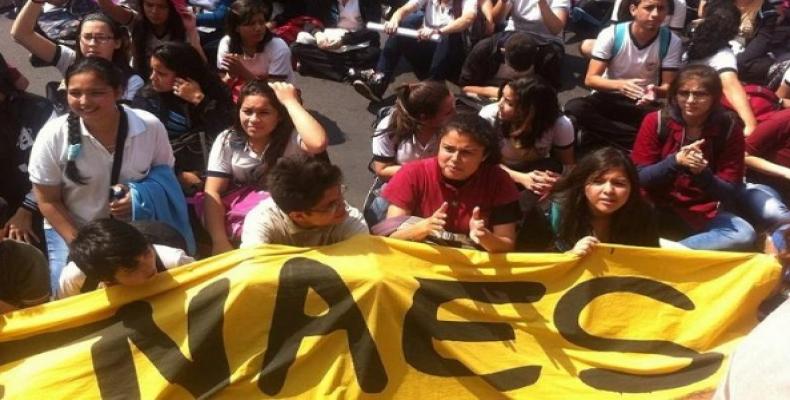Asunción, November 4 (teleSUR-RHC)-- A wave of popular protests and strikes rocked Paraguay on Tuesday as popular discontent with the national government reached a breaking point in the South American country.
High school students, teachers, public transportation workers and health sector workers all held strikes and marches protesting government policies.
The National Secondary School Students Federation, known as Fenaes, and teachers from various labor unions rallied outside the National Congress in Asunción to demand greater investment in education. Students and educators also called for a new universal school lunch program and infrastructure improvements.
Teachers said their calls echoed longstanding demands of labor unions and the strong turnout spoke to the “historical debts” owed to the educational sector.
Marches come after Fenaes launched a sit-in on Sunday to watch over discussions of the 2016 national budget in Congress and put pressure on lawmakers to allocate more funding for education.
The actions follow national student mobilizations in September, when Fenaes protested against corruption in the education system and launched a campaign to demand a 3 to 7 percent investment of the total GDP in education.
Meanwhile, transportation workers on Tuesday continued their second day of a two-day strike in solidarity with 51 bus drivers who were laid off in June. According to workers, the layoffs came without notice after their colleagues attempted to form a union to address miserable working conditions and long hours.
Following the layoffs, over a dozen bus drivers nailed themselves to wooden crosses in a symbolic protest of the lack of labor protections and unfair downsizing.
The ongoing transit protests demand the “crucified” drivers be rehired. The strike is also a protest against the anti-union policies of President Cartes’ government.
The diverse mobilizations follow a massive farmer's march last week demanding Cartes’ resignation and an end to policies they say contribute to poor living conditions in rural areas.
Meanwhile, progressive Paraguayan intellectuals have come out in support of the popular uprising. “We support and extend our solidarity to the student movement and rebellions in Paraguay, to farmers struggles for democratization of land tenure, to union struggles, to mobilizations against neo-liberal, anti-democratic policy and against the policy of criminalization of peoples’ struggles by the ruling regime in the country,” said a statement issued by participants in the First Meeting of Progressive Intellectuals of Paraguay.
President Cartes has seen high disapproval ratings since coming to office in 2013 and has come under fire within his own party for undermining institutional stability.


